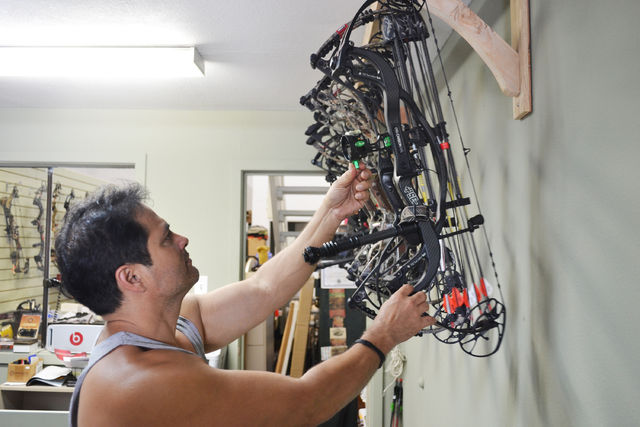KOKEE — For Walter Paresa, hunting provides food for his family. “I appreciate what I’m shooting, but most of all, I love the meat,” said Paresa, owner of Elite Hunters in Lihue who has been an archery hunter for over
KOKEE — For Walter Paresa, hunting provides food for his family.
“I appreciate what I’m shooting, but most of all, I love the meat,” said Paresa, owner of Elite Hunters in Lihue who has been an archery hunter for over 35 years. “My whole family loves it. Nothing goes to waste.”
When Paresa heard the news that a popular hunting area on the Westside would remain open for another year, he was ecstatic.
“Hopefully it gives (stakeholders) another year of negotiating about the spot or replacing it with something else that is equivalent to that hunting area,” he said.
Hunting Unit A of the Kekaha Game Management Area will remain open until Aug. 1, 2017, giving the Department of Land and Natural Resources and the Department of Hawaiian Home Lands more time discuss the future of the gaming area on Kauai as well as similar spots statewide.
“The rationale is that it gives us further discussion on the game hunting issue,” said William Aila Jr., DHHL deputy chairman. “It’s not just focused on Kauai. We’ve had discussions on the Big Island and we’re still in discussions on Hawaiian homelands statewide.”
Aila said the area is planned for both agricultural homesteading and possible residential homes.
“I think in the (Kauai general island plan) there’s a certain part of it that talks about a special-use area where we’re looking at potential hydro development,” he said. “Because the hydro discussion is still early, it could result in (hydro power) and it could result in an improvement and additional revenue which could result in further development of that Puu Opae lands.”
Aila said there have been complaints from the Unit A area of irresponsible hunters shooting in the direction lessees.
Other hunting-related complaints include illegal trespassing and hunting in closed areas, according to DLNR officials. Non-hunter complaints of trespassing and illegal dirt biking also surfaced.
“The challenges for both DLNR and DHHL are finding a balance to provide for the interests of the Hawaiian Home Land beneficiaries and to provide for the interests of the broader Kauai hunting community,” said Thomas Kaiakapu, branch wildlife biologist for the DLNR Kauai Division of Forestry and Wildlife.
In fiscal year 2016, about 2,150 hunting licences were sold to Kauai residents. That’s about 18 percent of the total number of hunting licences sold statewide.
More than half of the licensed hunters on Kauai hunt in the Kekaha Game Management Area and more than one-third of all game harvested on Kauai is from that area, according to DLNR.
Rep. James Tokioka (D-15) said to restrict hunting would be devastating to the people who rely on it for sustenance.
“For some people, that’s how they live: whether they sell smoke meat or whether they hunt for their families,” Tokioka said. “As for as the economy is concerned, hunters purchasing guns and knives to go hunt, it affects their pocketbooks if they are not going to be able to do it. They won’t have the pork to eat. They’re going to have to purchase food at the store, and that’s going to be a hardship on the family.”
Tokioka said he hopes the DHHL and DLNR will come to an agreement to extend the license further after next year.
“I certainly think the two agencies need to sit down and think what’s best for the people of Kauai and resolve whatever outstanding issues there are,” he said.
Rep. Dee Morikawa (D-16) suggests land exchanges with DHHL and the state to keep hunting open, while providing land for Hawaiian homeowners.
“We need to see what we can give them — maybe around Hanapepe, Waimea or Kekaha — because there’s a lot of state land,” Morikawa said. “We need to see if we can work in a deal, so they can get good land and they can build homes quicker. That’s going to be a tough talk, but we have to figure out something.”
She added that hunting is beneficial to the economy, islandwide as well as statewide.
“These hunters that come over to the Westside stop at our stores — Waimea, Hanapepe — and they go up to Kokee and utilize the park,” she said. “They definitely add.”
Kimberly Sarita, a local hunter and co-owner of Elite Hunters, agreed with Morikawa.
“For some people, it supplements their incomes by hunting. Just to survive they resort to (hunting),” Sarita said. “The Westside needs to generate money. You take that away from them, it’s two steps forward and 10 steps back.”
Rep. Derek Kawakami (D-14) said one of hunting’s major economic benefit to the island is watershed protection.
“These pigs and goats are probably our biggest detriment to our watersheds, and having hunters managing the population is service to the state of Hawaii and the island of Kauai,” he said. “Our own agencies would not be able to manage that game if we had not had that wonderful partnership with our hunting community. If we had to hire people to do what our recreational hunters do, the price would be exponentially out of reach.”


